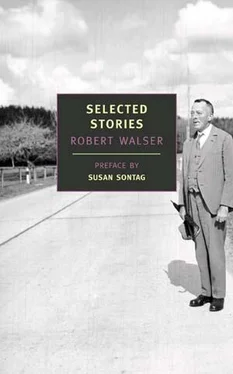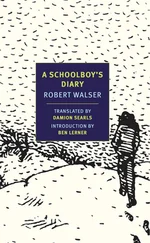At times on ordinary weekdays the whole small town seems to him bewitched by sun and stillness. He stands motionless before the strange old town hall, with the sharp-edged numerals of its date cut in the gleaming white wall. It is all so irretrievable, like the form of a folk song the people have forgotten. Hardly alive, no, not alive at all. He mounts the enclosed wooden stair to the castle where the old earls lived, the wood gives off the odor of age and of vanished human destinies. Up here he sits on a broad, curved, green bench to enjoy the view, but closes his eyes. It all looks so terrible, as if asleep, buried under dust, with the life gone out of it. The nearest thing lies as in a faraway veil-like dreaming distance. Everything is sheathed in a hot cloud. Summer, but what sort of a summer? I am not alive, he cries out, and does not know where to turn with his eyes, hands, legs, and breath. A dream. Nothing there. I do not want dreams. In the end he tells himself he lives too much alone. He shudders, compelled to admit how unfeeling is his relation to the world about him.
Then come the summer evenings. Kleist sits on the high churchyard wall. Everything is damp, yet also sultry. He opens his shirt, to breathe freely. Below him lies the lake, as if it had been hurled down by the great hand of a god, incandescent with shades of yellow and red, its whole incandescence seems to glow up out of the water’s depths. It is like a lake of fire. The Alps have come to life and dip with fabulous gestures their foreheads into the water. His swans down there circle his quiet island, and the crests of trees in dark, chanting, fragrant joy float over — over what? Nothing, nothing. Kleist drinks it all in. To him the whole dark sparkling lake is the cluster of diamonds upon a vast, slumbering, unknown woman’s body. The lime trees and the pine trees and the flowers give off their perfumes. There is a soft, scarcely perceptible sound down there; he can hear it, but he can also see it. That is something new. He wants the intangible, the incomprehensible. Down on the lake a boat is rocking; Kleist does not see it, but he sees the lanterns which guide it, swaying to and fro. There he sits, his face jutting forward, as if he must be ready for the death leap into the image of that lovely depth. He wants to perish into the image. He wants eyes alone, only to be one single eye. No, something totally different. The air should be a bridge, and the whole image of the landscape a chair back to relax against, sensuous, happy, tired. Night comes, but he does not want to go down, he throws himself on a grave that is hidden under bushes, bats whiz around him, the pointed trees whisper as soft airs pass over them. The grass smells so delicious, blanketing the skeletons of buried men. He is so grievously happy, too happy, whence his suffocation, his aridity, his grief. So alone. Why cannot the dead emerge and talk a half hour with the lonely man? On a summer night one ought really to have a woman to love. The thought of white lustrous breasts and lips hurls Kleist down the hill to the lakeside and into the water, fully dressed, laughing, weeping.
Weeks pass, Kleist has destroyed one work, two, three works. He wants the highest mastery, good, good. What’s that? Not sure? Tear it up. Something new, wilder, more beautiful. He begins The Battle of Sempach, in the center of it the figure of Leopold of Austria, whose strange fate attracts him. Meanwhile, he remembers his Robert Guiscard. He wants him to be splendid. The good fortune to be a sensibly balanced man with simple feelings he sees burst into fragments, crash and rattle like boulders collapsing down the landslip of his life. He helps him nevertheless, now he is resolute. He wants to abandon himself to the entire catastrophe of being a poet: the best thing is for me to be destroyed as quickly as possible.
What he writes makes him grimace: his creations miscarry. Toward autumn he is taken ill. He is amazed at the gentleness which now comes over him. His sister travels to Thun to bring him home. There are deep furrows in his cheeks. His face has the expression and coloring of a man whose soul has been eaten away. His eyes are more lifeless than the eyebrows over them. His hair hangs clotted in thick pointed hanks over his temples, which are contorted by all the thoughts which he imagines have dragged him into filthy pits and into hells. The verses that resound in his brain seem to him like the croakings of ravens; he would like to eradicate his memory. He would like to shed his life; but first he wants to shatter the shells of life. His fury rages at the pitch of his agony, his scorn at the pitch of his misery. My dear, what is the matter, his sister embraces him. Nothing, nothing. That was the ultimate wrong, that he should have to say what was wrong with him. On the floor of his room lie his manuscripts, like children horribly forsaken by father and mother. He lays his hand in his sister’s, and is content to look at her, long, and in silence. Already it is the vacant gaze of a skull, and the girl shudders.
Then they leave. The country girl who has kept house for Kleist says goodbye. It is a bright autumn morning, the coach rolls over bridges, past people, through roughly plastered lanes, people look out of windows, overhead is the sky, under trees lies yellowish foliage, everything is clean, autumnal, what else? And the coachman has his pipe in his mouth. All is as ever it was. Kleist sits dejected in a corner of the coach. The towers of the castle of Thun vanish behind a hill. Later, far in the distance, Kleist’s sister can see once more the beautiful lake. It is already quite chilly. Country houses appear. Well, well, such grand estates in such mountainous country? On and on. Everything flies past as you look to the side and drops behind, everything dances, circles, vanishes. Much is already hidden under the autumn’s veil, and everything is a little golden in the little sunlight which pierces the clouds. Such gold, how it shimmers there, still to be found only in the dirt. Hills, scarps, valleys, churches, villages, people staring, children, trees, wind, clouds, stuff and nonsense — is all this anything special? Isn’t it all rubbish, quotidian stuff? Kleist sees nothing. He is dreaming of clouds and of images and slightly of kind, comforting, caressing human hands. How do you feel? asks his sister. Kleist’s mouth puckers, and he would like to give her a little smile. He succeeds, but with an effort. It is as if he has a block of stone to lift from his mouth before he can smile.
His sister cautiously plucks up the courage to speak of his taking on some practical activity soon. He nods, he is himself of the same opinion. Music and radiant shafts of light flicker about his senses. As a matter of fact, if he admits it quite frankly to himself, he feels quite well now; in pain, but well at the same time. Something hurts him, yes, really, quite correct, but not in the chest, not in the lungs either, or in the head, what? Nowhere at all? Well, not quite, a little, somewhere so that one cannot quite precisely tell where it is. Which means: it’s nothing to speak of. He says something, and then come moments when he is outright happy as a child, and then of course the girl makes a rather severe, punitive face, just to show him a little how very strangely he does fool around with his life. The girl is a Kleist and has enjoyed an education, exactly what her brother has wanted to throw overboard. At heart she is naturally glad that he is feeling better. On and on, well well, what a journey it is. But finally one has to let it go, this stagecoach, and last of all one can permit oneself the observation that on the front of the villa where Kleist lived there hangs a marble plaque which indicates who lived and worked there. Travelers who intend to tour the Alps can read it, the children of Thun read it and spell it out, letter by letter, and then look questioning into each other’s eyes. A Jew can read it, a Christian too, if he has the time and if his train is not leaving that very instant, a Turk, a swallow, insofar as she is interested, I also, I can read it again if I like. Thun stands at the entrance to the Bernese Oberland and is visited every year by thousands of foreigners. I know the region a little perhaps, because I worked as a clerk in a brewery there. The region is considerably more beautiful than I have been able to describe here, the lake is twice as blue, the sky three times as beautiful. Thun had a trade fair, I cannot say exactly but I think four years ago.
Читать дальше












